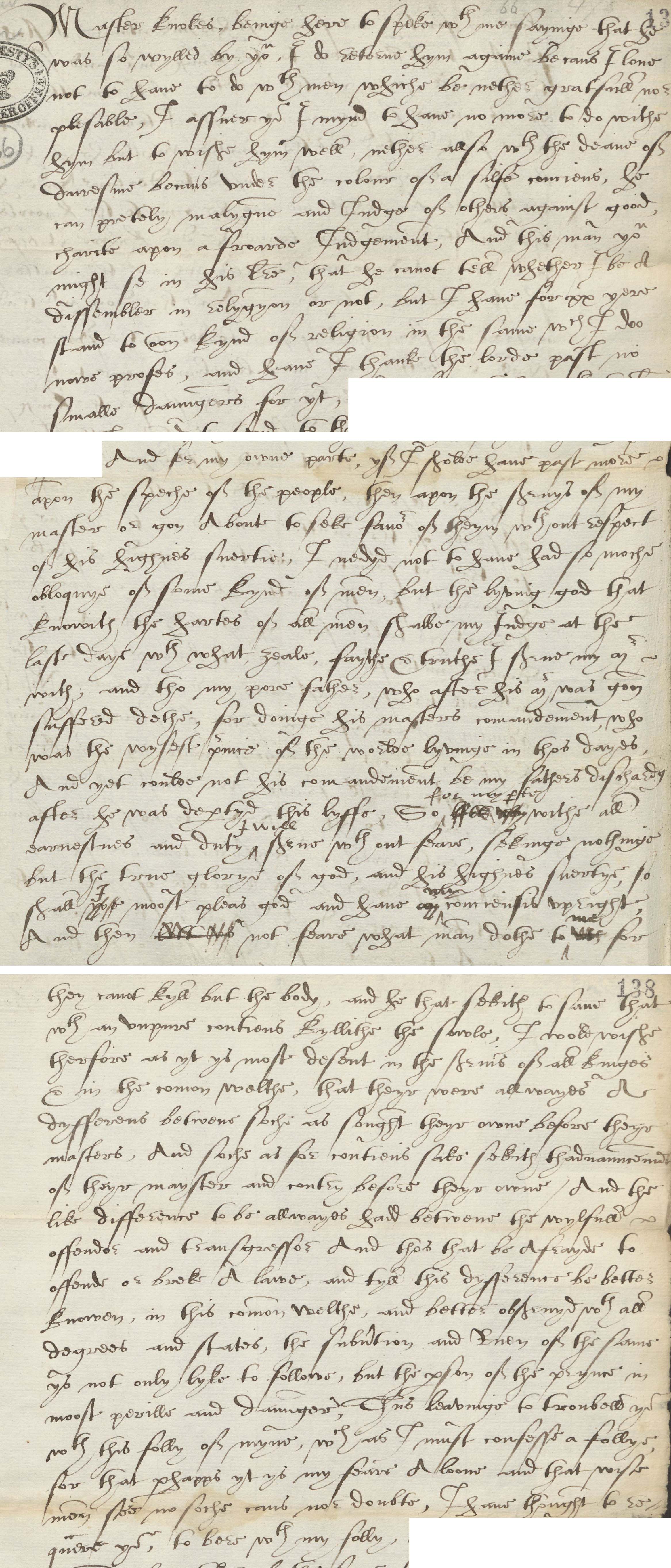
Duke of Northumberland to William Cecil, 7 December, 1552 (SP10/15/66, f.137r-138r)
This letter is largely about a plot that the Dean of Durham (Robert Horne) had discovered, that the Earl of Westmorland was going to proclaim that the coinage had a higher value than it did. In the letter, Northumberland reveals what others think of his religion, his own religious beliefs, and how he understands his political role as a royal servant. There is a real sense of intimate friendship between the Earl and Cecil.
Transcript
Master knokes[1] being here to speak with me saying that he was so willed by you I do return him again because I love not to have to do with men which be neither grateful nor easy to please I assure you I mind to have no more to do with him but to wish him well neither also with the dean of drusem[2] because under the colour of a silfe [clear] conscience, he can, prettily malign and judge of others against good charity upon a forward judgement. And this man you might see in his letter, that he cannot tell whether I be a dissembler in religion or not, but I have for twenty years [standing] to one kind of religion in the same which I do now profess, and have, I thank the lord past no small dangers for it …
[f.137v]
And for my own part, if I should have past more upon the speech of the people, then upon the service of my master [the King] or gone about to seek favour of them without respect of his highnesses sureties [pledges], I needed not to have had so much obloquys [abuse] of some kind of men, but the living god that knows the hearts of all men shall be my judge at the last day with what zeal, faith, & truth I serve my master with, and though my poor father,[3] who after his master [Henry VII] was gone suffered death, for doing his master’s commandment, who was the wisest prince of the world living in those days. And yet could not his commandment be my father’s discharge after he was departed this life. So for my part with all earnestness and duty I will serve without fear, seeking nothing but the true glory of god, and his highness surety so shall you most please god and have my conscience upright, And then … not fear what man doth to me for
[f.138r]
they cannot kill but the body, and he that seeks to save that with an impure conscience kills the soul, I would wish therefore as it is most decent in the service of all kings & in the common wealth, that there were always a difference between such as sought their own before their masters, and such as for conscience sake seek the advancement of their masters and country before their own. And the like difference to be always had between the wilful offender and transgressor and those that be afraid to offend or break a law, and till this difference be better known, in this commonwealth and better observed with all degrees and states, the subversion and ruin of the same is not only like to follow, but the person of the prince in most peril and danger, Thus leaving to trouble you with this folly of mine, which as I must confess a folly, for that perhaps it is my fear alone and that wise men see no such cause nor doubt, I have thought to require you, to bear with my folly…
[1] John Knox, the Scottish reformer. He had close ties with the Edwardian regime, and had been offered a bishopric (though he turned it down).
[2] Robert Horne, Dean of Durham, whom Northumberland called ‘peevish’, greedy and malicious. Horne had angered the Earl by saying that he would be happy to be promoted to the bishopric of Durham but only on his own terms.
[3] Edmund Dudley, an administrator for Henry VII and who worked with Richard Empson.
